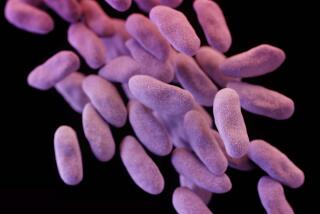Closing in on E. coli
- Share via
ONE way to avoid the horrible effects of E. coli infection is to cook meat thoroughly, killing any bacteria present. But if Vanessa Sperandio is successful, there may someday be another way to halt the illness.
Sperandio, an assistant professor of microbiology at the University of Texas Southwestern Medical Center in Dallas, uncovered just what happens when the most dangerous strain of E. coli hits the human digestive system. The results of her work, published this month in the Proceedings of the National Academy of Sciences, could help scientists design treatments that might stop the bacterium from wreaking havoc.
The strain known as E. coli O157:H7 is a major cause of diarrheal illness, and infection with the organism can cause bloody diarrhea and sometimes kidney failure and death.
“E. coli is a problem here and all over the world,” says Sperandio. “It’s an emerging pathogen -- meaning it became what it is recently. That’s why we know so little about it.”
Now we know more. Using cell cultures, Sperandio found that when a person ingests E. coli O157:H7, the bacteria travel passively through the digestive tract until they reach the intestine. There, harmless bacteria in the intestine and adrenaline send signals to the E. coli, spurring some of its genes to release nasty toxins. The cascade of cramping, nausea and diarrhea then begins.
“E. coli sees those two signals, knows where it is and activates everything,” says Sperandio. “It hijacks a process that is already there.”
The research provides scientists with a new way to think about E. coli, says Alison O’Brien, a microbiologist at the Uniformed Services University of the Health Sciences in Bethesda, Md.
“It’s intriguing how bacteria talk to each other,” says O’Brien. “If we understand it better at the molecular level, we have the chance of intervening.”
Currently, someone with an infection must wait it out while drinking fluids to avoid dehydration. However, young children, the elderly and people with weakened immune systems are in danger of developing kidney problems (damaged red blood cells can clog the kidneys or cause lesions, making the kidneys work harder to remove waste), which may require dialysis.
Doctors sometimes prescribe antibiotics in severe cases of E. coli poisoning, but some studies suggest that antibiotics can make the situation worse.
Sperandio’s research suggests that beta blockers, or a drug similar to beta blockers, could shut off the cascade of events in the intestine that causes diarrhea. Beta blockers bind to adrenaline.
“Beta blockers shut down the whole E. coli response,” she says. “You’re attacking the signals and rendering the E. coli blind. It can’t see where it is, so it doesn’t produce anything. It just goes through.”
Much research remains before a treatment based on this concept becomes available. Scientists will need to see if a beta blocker-type drug works, if there are side effects and what kind of dose would be needed. Ideally, says Sperandio, a drug similar to a beta blocker but designed for E. coli infection would probably work best.
Scientists also are working on other ways to stop E. coli illness, says O’Brien.
“There is a great deal of interest in blocking it in the cow, getting the bug out of the food, how the host responds, how the host and bug interact and preventing the [bloody diarrhea],” she says.
*
(BEGIN TEXT OF INFOBOX)
Facts about the bacteria
* There are hundreds of strains of the E. coli bacterium, most of which are harmless. The strain known as O157:H7, which originates in the intestines of cattle, is the cause of most serious illness. The combination of letters and numbers in the name refers to specific markers on its surface and distinguishes it from other types of E. coli.
* Each year, about 73,000 cases of E. coli O157:H7 infection occur in the United States, and about 60 people die.
* The bacteria are usually carried in under-cooked hamburger or in unpasteurized milk. E. coli can also spread in sewage-contaminated water and from person-to-person contact through poor hygiene.
* E. coli infection can cause diarrhea or bloody diarrhea. In some vulnerable people, such as children under 5 and the elderly, bloody diarrhea can lead to an infection called hemolytic uremic syndrome in which the kidneys fail.
This complication occurs in 2% to 7% of cases.
* To avoid E. coli O157:H7 poisoning, cook meat until the thickest part reaches a temperature of 160 degrees or until the meat is no longer pink. Keep raw meat separate from ready-to-eat foods in your kitchen. Wash hands, counters and utensils with hot, soapy water after they touch raw meat. Drink only pasteurized milk, juice or cider. Wash fruits and vegetables thoroughly. Avoid swallowing lake or pool water.
*
Source: Centers for Disease Control and Prevention






